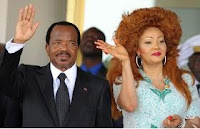Paul Biya Cementing his Dictatorship in Cameroon
 |
| President Paul and Chantal Biya |
The citizens of Cameroon have gone to the polls to elect their President. The field includes incumbent President Paul Biya and 22 opposition candidates. The aging President Paul Biya has been ruling the nation since 1982 effectively cementing his place in the club of Africa’s longest serving dictators which still includes the likes of Robert Mugabe. This year however the club lost two members, Tunisian President Zine El Abidine Ben Ali and Libyan dictator Muammar Gaddafi.
There are reports that there has been low turnout in the polls and some opposition candidates are accusing the President of vote buying and ignoring the voters. Reports from Cameroon indicate that most voters are not enthusiastic about opposition candidates and have decided to stay home because they believe the President will win anyway. Paul Biya is expected to win the election and extend his term by another 7 years. In the previous election in 2004, President Biya won with almost 70% of the vote. In 2008 the President amended the constitution so that he would be able to run for another term. Biya’s political career took shape when he was named prime minister in 1975 then President when President Ahmadou Ahidjo suddenly announced his retirement on health grounds in November 1982.
CAMEROON
French Cameroon became independent in 1960 as the Republic of Cameroon. The following year the southern portion of neighboring British Cameroon voted to merge with the new country to form the Federal Republic of Cameroon. In 1972, a new constitution replaced the federation with a unitary state, the United Republic of Cameroon. The country has generally enjoyed stability, which has permitted the development of agriculture, roads, and railways, as well as a petroleum industry.





